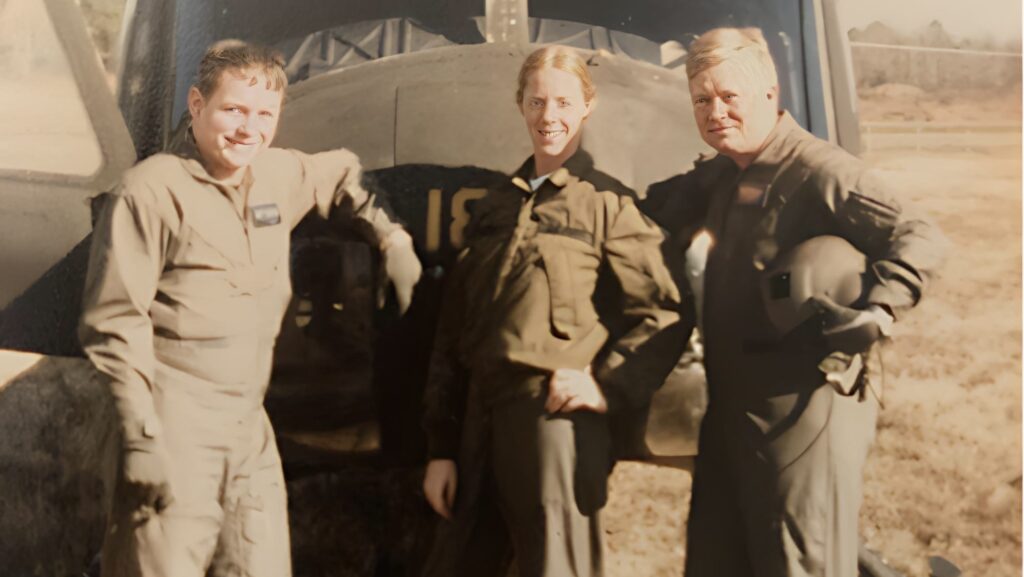Editor’s Note: This story originally appeared in the Fall/Winter 2023 edition of Contact magazine, and was looking at the experience of Homecoming 2023. KWU hopes many alumni will “Come Home” for the 2024 version of the event, set for Oct. 18-20, 2024, when Sams Chapel will officially reopen.
Diane (McGuire) Davis has not been able to attend events at Kansas Wesleyan University since her graduation in 1973.
But after a military career that took her to numerous cities and several countries, she thought it was time to come home.
Davis was excited about flying into Salina from her home in North Carolina for her 50th class reunion on Oct. 20-22, although flying is old hat for her. One of the original 100 women to complete the U.S. Army flight program, she spent five years as a helicopter and fixed-wing aircraft pilot in the U.S. Army, retiring as a captain after 10 years in the service.
It was a far cry from the occupation she had grown up dreaming about. And it wasn’t the life that Davis might have expected to lead when she made her first flight to Salina in 1970.
A native of New York with a strong Methodist upbringing, Davis began her college career at Virginia Wesleyan University.
After her freshman year, Davis and her family decided to look for a college with the same strong Methodist-based foundation where she could fully concentrate on her education. They found the perfect spot in landlocked Kansas.
“The only thing I knew about Kansas was that it was known for wheat fields and tornadoes,” she said. “But I wanted to get a college degree.”
Although the wide-open spaces were a stark difference from the popular oceanfront and boardwalks of Virginia Beach, Davis fell in love with the KWU campus culture immediately.
Throughout her career at Kansas Wesleyan, she was a cheerleader, served as associate editor of the school newspaper and participated in school government. And, according to the 1973 yearbook, she was, “in general, the campus live wire.”
“I tried to encourage other students to get involved with things on campus; that is so much of the entire college experience,” she said. “It was a small school and a nice environment, and the professors were wonderful.”
All the while, she worked on her bachelor’s degree in education with the goal of fulfilling her lifelong dream of becoming a schoolteacher like her father.
However, unlike today, that was a time when there were a glut of elementary schoolteachers.
“For every elementary school job offered, there were 500 applicants,” she said.
In search of a job in another field until she landed that coveted teaching job, Davis checked out her options in the military.
The Army offered her a chance to learn skills as an eyes, ears, nose and throat corpsman, and she went on to work in a hospital for two years.
Always in search for more education, she successfully applied for a commission, went to officers training for four months and became a signal corps officer, then a platoon leader.
Her zest for learning didn’t stop there.
When a friend in a nearby battalion told her they were allowing women in aviation, Davis passed that test and quickly became the class leader as the only woman in her class of 37.
“It was the most wonderful experience I ever had in my life,” she said. “I loved flying helicopters.”
She flew Guardrail (multi-engine turboprop) aircraft that provided aerial intelligence and surveillance back to the ground to our troops.
One of the airplanes she flew is on static display at Hunter Army Airfield in Savannah, Ga.
Davis always wanted to fly a Cobra, but women weren’t allowed to fly gunships with weapons attached during those days.
“A lot has changed since I was there,” she said.
She met her husband, Tad, while stationed in Savannah, Ga., and she eventually traded the skies for a classroom. After landing her first teaching job, Davis spent 19 years in the education field, while her husband’s assignments took the family to various sites across the country and abroad.
“A teaching background was such a great thing to have,” she said, “because they needed teachers everywhere I’ve been.”
Davis and her husband, a retired Army colonel, raised two daughters, who she said benefited greatly from their parents’ military life.
“It provided them so many experiences and opportunities,” she said. “They learned to ski in the Alps, attended school in Germany and learned to speak foreign languages.”
Now, Davis is looking forward to coming back to where it all began.
“I’m a little hesitant,” she admitted before Homecoming. “We all moved away and kind of lost touch with each other. I looked at my yearbook to remind myself of what it was like back then. I think it’ll be a great time.”
Story by Diane O’Brien


